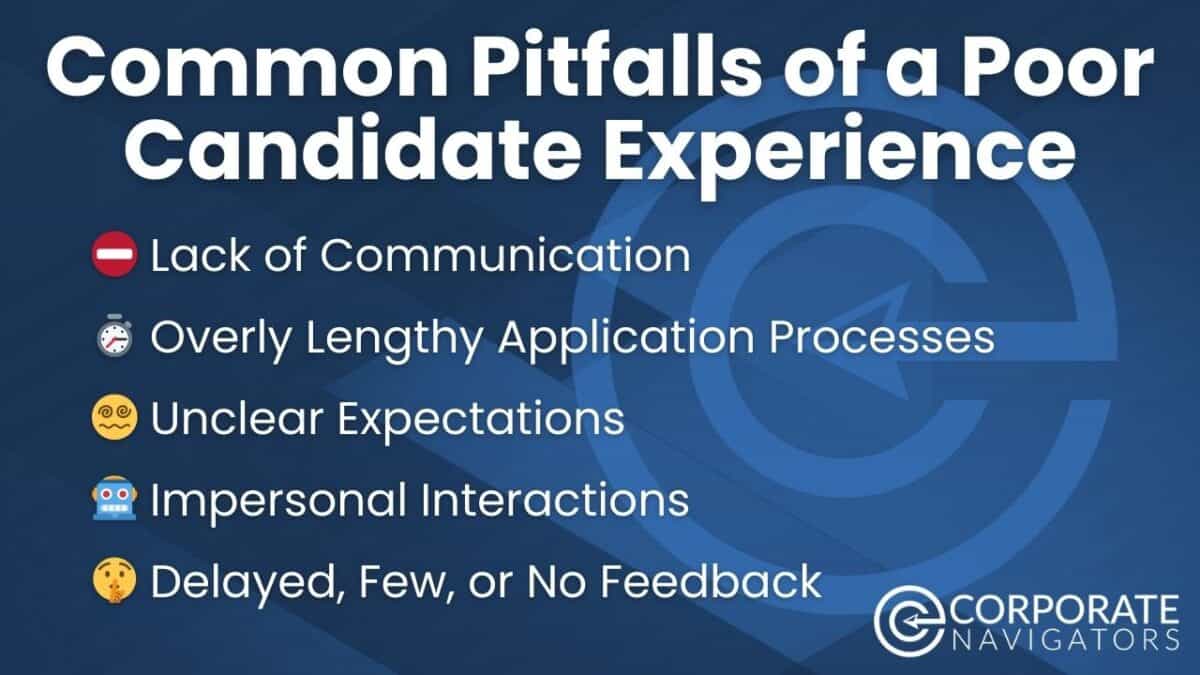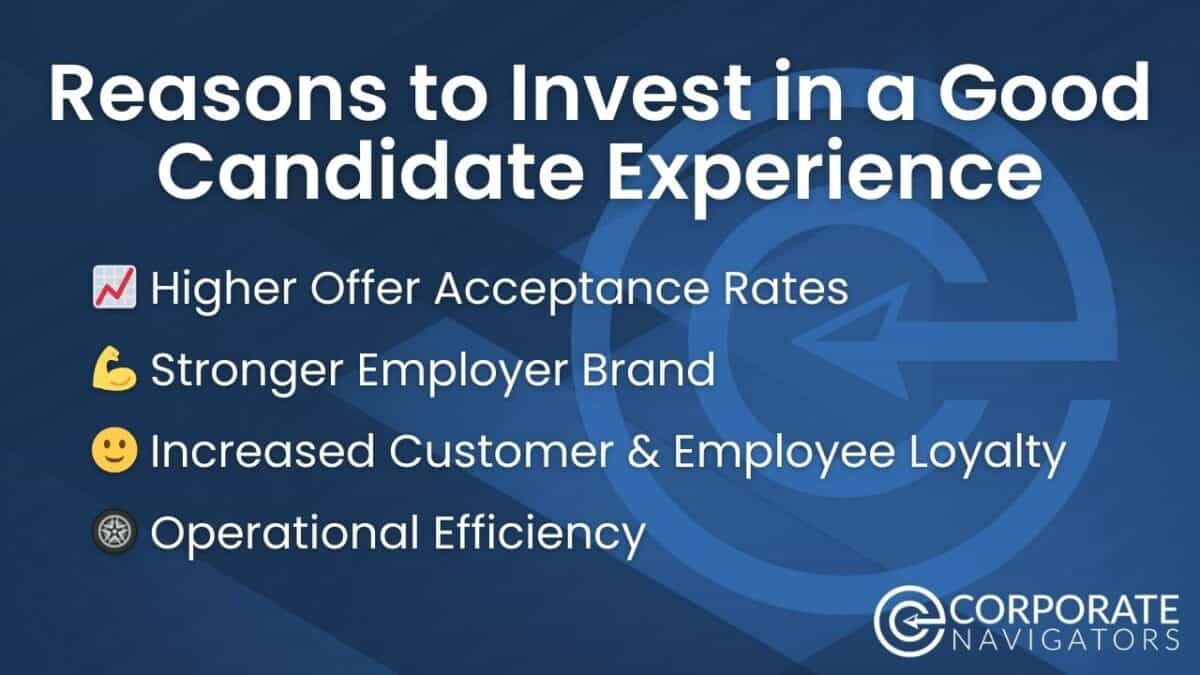
Table of Contents
The Hidden Costs of a Poor Candidate Experience
Not too long ago, we published an article that explained why offering a positive candidate journey is so important. From initial contact to completing the job interview process to onboarding, the entire hiring process has a direct impact on both the candidate and the employer. While providing a positive candidate experience delivers benefits such as increased employee retention and loyalty, a negative candidate experience does the opposite.
In fact, a negative candidate experience can have far-reaching consequences for your organization. Recent studies have revealed some eye-opening statistics:
- 63% of people seeking job opportunities would reject a job offer due to a bad candidate experience.
- 72% of candidates on the job market who had a negative experience shared it online or with others.
- 64% of job posting seekers say a poor candidate experience would cause them to stop purchasing goods or services from a company.
These numbers highlight the critical importance of creating a positive job application process. Not only does it affect your ability to attract top talent, but it can also impact your brand reputation and even your bottom line.
Is your recruitment process optimized for success? It’s time to take a closer look and ensure you’re not inadvertently turning away valuable talent.

The Hidden Costs of a Bad Candidate Experience: Why It Matters and How to Fix It
Companies invest heavily in employer branding, recruitment marketing, and sourcing strategies to stand out. However, one critical element often gets overlooked: the candidate experience. What many organizations fail to realize is that a poor candidate experience doesn’t just impact their ability to hire—it can also harm their reputation, customer loyalty, and even revenue.
Let’s dive into the hidden costs of a poor candidate experience, why it matters more than ever, and how your organization can turn things around.
Why Candidate Experience Matters
The candidate experience encompasses every interaction a job seeker has with your company during the recruitment process, from the moment they learn about your job opening to the final communication after a hiring decision is made. It’s not just about being polite or professional; it’s about creating a seamless, transparent, and respectful process that leaves candidates feeling valued.
Here’s why it matters:
1. Your Reputation at Risk
According to studies, 63% of job seekers who have a negative application experience share it with their professional network or post about it online. Platforms like Glassdoor, LinkedIn, and social media amplify these voices, meaning one bad review can reach thousands—or even millions—of potential candidates.
2. Lost Talent
A poor candidate experience can drive top talent away. Research shows that 72% of candidates who had a negative experience would discourage others from applying to the same company. This creates a ripple effect, making it harder for you to attract qualified applicants in the future.
3. Negative Impact on Revenue
The consequences extend beyond hiring. A study by The Talent Board found that 64% of candidates who had a bad experience would stop purchasing goods or services from that company. For consumer-facing brands, this can lead to significant revenue losses.
What Are the Common Pitfalls in a Candidate Journey?
To improve the candidate experience, it’s essential to understand where things often go wrong during talent acquisition. Here are some common pitfalls:
- ⛔ Lack of Communication: Candidates frequently report frustration with “radio silence” after submitting an application or attending an interview.
- ⏱️ Overly Lengthy Application Processes: Long and cumbersome applications deter candidates from completing them.
- 😵💫 Unclear Expectations: Job descriptions that lack clarity or interviews that don’t align with the role create confusion.
- 🤖 Impersonal Interactions: Candidates want to feel like more than just a number. Automated responses without personalization can leave them feeling undervalued.
- 🤫 No Feedback: Candidates often complain about not receiving feedback after interviews, leaving them in the dark about why they weren’t selected.

How to Fix It: Building a Positive Candidate Experience
Improving your candidate experience isn’t just good for job seekers—it’s good for business. Here are actionable steps you can take:
Audit Your Recruitment Process
Conducting a comprehensive audit of your recruitment process is the first step toward improvement. Identify bottlenecks, inefficiencies, and areas where communication breaks down. At Corporate Navigators, we’ve developed a Candidate Experience Audit Tool that has helped clients improve their application completion rates by an average of 41%.
Streamline Applications
A candidate’s time is a hot commodity, and wasting any sours their job search. Therefore, simplify your application process by removing unnecessary steps and making it mobile-friendly. A shorter application increases completion rates and ensures you don’t lose qualified candidates along the way. Employing an applicant tracking system (ATS) to expedite some rote tasks and enhance communication with candidates can also further streamline applications and more.
Communicate Clearly and Often
Keep candidates informed at every stage of the process. Excellent, clear communication is the cornerstone of a great candidate experience. Send timely updates about their application status, outline the next steps clearly, and provide estimated timelines. Consistent communication is incredibly important to building a good rapport with your candidates.
Personalize Interactions
Use technology wisely to personalize communication while maintaining efficiency. For example, tailor automated emails with the candidate’s name and reference their specific application. Also, make the most critical steps human-centric, such as the in-person element of the job interview experience. Don’t leave everything to AI!
Provide Feedback
Don’t ghost! Whether a candidate gets the job or not, providing constructive candidate feedback shows respect for their time and effort. Timely follow-ups also leave them with a positive impression of your company.
Train Your Hiring Team
Ensure recruiters and hiring managers are trained in delivering a positive candidate experience—from conducting respectful interviews to managing expectations effectively.
Reasons to Invest in a Good Candidate Experience
Improving your candidate experience isn’t just about being nice. It’s about driving measurable results for your organization, which include but are not limited to:
- 📈 Higher Offer Acceptance Rates: Candidates who have positive experiences are more likely to accept job offers.
- 💪 Stronger Employer Brand: A good reputation that boasts a positive company culture sets a great first impression on social media and attracts more top-tier talent.
- 🙂 Increased Customer Loyalty: For consumer-facing companies, treating candidates well can translate into loyal customers.
- 🙂 Increased Employee Loyalty: Not only do you gain the loyalty of customers, but employees also feel more loyal to your organization when they are treated well as candidates and new hires.
- 🛞 Operational Efficiency: Streamlining processes saves time for both recruiters and candidates.
Is Your Recruitment Process Leaving a Positive Impression?
The hidden costs of a poor candidate experience are too significant to ignore. From damaging your brand reputation to losing out on top talent and even impacting revenue, the stakes are high, but so are the opportunities for improvement.
By auditing your recruitment process, enhancing communication, and personalizing interactions, you can create an exceptional candidate experience that sets your organization apart from competitors.
At Corporate Navigators, we specialize in helping companies optimize their recruitment strategies for success. Ready to transform your candidate experience? Let’s connect!



